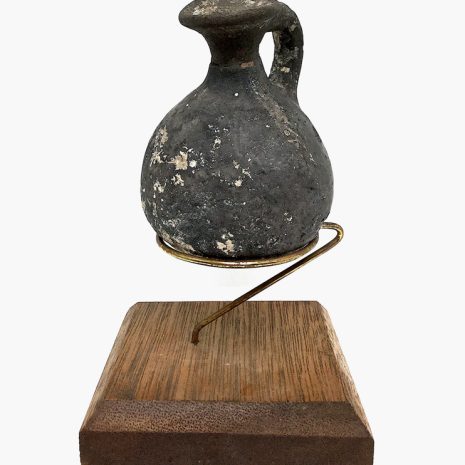Ancient Biblical Period Burnished Juglet, Judea #1937DKE
Original price was: $375.00.$195.00Current price is: $195.00.
H: 3.375” W: 2.75” D: 2.5” oN STAND h: 5.5” | FREE SHIPPING within Continental U.S.
This ancient hand made ancient pottery juglet from biblical Judea has a globular body, a round base and a short neck flaring into a triangular mouth and its circular handle runs from its mouth to the shoulder.
Description
This black burnished earthenware juglet was made about the time the Jewish people returned from exile in Babylonia to Judea in the Holy Land (the Levant) during the Biblical Period (circa 600-300BCE). Then during the Iron Age, coil construction was used to make functional pieces and were finished using the paddle-and-anvil method to compact and remove excess moisture from clay and make body walls more smooth. A slip was often added to avoid leakage and make pouring-vessels less porous. This juglet was also burnished to further smooth and compact its surface before drying it to a leather-hard state for pit firing. These methods were used before kilns and glazes made vessels completely watertight and added a subtle beauty to their surfaces. This piece from ancient history is more than two millennia old and has a wood and wire display. A similar juglet can be found on the Lahav Research Project site that discusses biblical archeological finds. There, Tom Frank writes then items like this began to be made to a higher quality and held cosmetics, scented oils and perfumes. This piece is in good condition, has expected losses and adherents consistent with its age, and parts of the neck, mouth and handle were damaged during burial requiring restoration.
Sources
Tom Frank, “Imagining the Past: Archeology and the Bible: a juglet to anoint,” (Sept 2014),
Additional information
| Weight | 6 lbs |
|---|---|
| Dimensions | 12 × 9 × 6 in |
| Place of Origin | Ancient Mediterranean |
| Period | Ancient, Biblical Period |
| Date | 600-300 B.C.E |
| Materials and Technique | Earthenware |
| Dimensions (inches) | Ht: 3.375” W: 2.75”, D: 2.5” Ht on Stand: 5.5” |
| Dimensions (metric) | Ht: 8.579cm W: 6.98cm D: 6.35cm Ht on Stand: 13.97cm |
| Condition | Good condition with repairs, see description |
| Weight | 3.1oz |
| Item Number | 1937DKE |
| Shipping Box Size |










